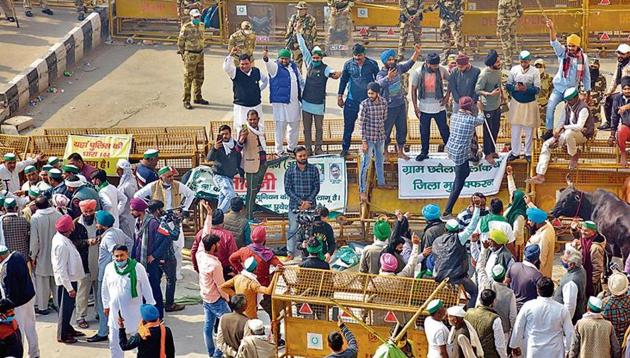How the Centre can resolve the deadlock over new farm laws
Protests by thousands of farmers against a set of farm-reform laws they say will hurt their interests simmered for the seventh straight day, with talks deadlocked.
Protests by thousands of farmers against a set of farm-reform laws they say will hurt their interests simmered for the seventh straight day, with talks deadlocked.

While the farmers want the three laws revoked, and the passage of a new law guaranteeing minimum state-set prices for all major farm produce, the government has said the new laws will lead to better price discovery and bring investments to the farm sector.
On Thursday, the government is set to meet farmers for the fourth time. The endgame looks tricky but there are several fixes that the government can deploy to resolve the crisis without necessarily withdrawing the reforms.
Markets
In free markets proposed under the laws, traders don’t have to pay any fees. Farmers worry that the move to open free markets in competition to notified markets controlled by state governments could lead to a collapse of traditional markets.
Traditional markets serve as a big source of state revenue. In Punjab, they charge 6% fee (3% each as market fee and rural development fee) on wheat purchases. A 6% fee was also payable on non-basmati paddy while for basmati paddy, 4.25% fee was charged. In September 2020, after the Centre’s new laws came into force, Punjab was forced to reduce the market fee and rural development fee on basmati rice from 2% to 1% each.
Set up in the 1960s, these markets initially served as critical infrastructure for farmers to sell their produce and discover prices under the government’s supervision, thereby helping avoid distress sale.
Over time, these markets have grown opaque and monopolistic, with prices rigged to the advantage of middlemen, according to a 2010 probe by the India’s statutory anti-monopoly agency, the Competition Commission of India.
These markets are also interlocked meaning traders often lend money to farmers, but assure them of purchases, albeit below federally fixed minimum prices, creating a dependence that is entrenched. Since 90% of wheat and paddy in Punjab are bought and sold in these markets, the state government, farmers and middlemen are threatened alike.
“The government can come up with rules under the new laws to say that government procurement will mandatorily be done from traditional markets, while other private trade can simultaneously happen in free markets,” said RS Mani, an economist with the Tamil Nadu Agricultural University. This will show , over time, which markets serve farmers better, he said, while assuaging farmers’ fears that the new laws will kill the notified markets.
Minimum prices
Farmers have demanded a law guaranteeing minimum support prices (MSPs) for all major farm produce. The aim is to make the sale of any farm produce below its MSP threshold illegal. There are economic constraints to such a law, such as its impact on inflation. While farmers want price assurance, the government has focused on reforms to result in better price discovery.
Experts say there are several ways to assure returns, such as a price-deficiency mechanism, which the government could lay down during the negotiations. “Price deficiency (mechanism) has been tried in Madhya Pradesh. It needs to be refined, but it can be a way to compensate when markets are down,” said Rohini Mali, an independent consultant, who was formerly advisor of food systems, FAO in Rome. Under the price deficiency system, the government pays the difference between market price and MSP to farmers.
Stubble burning
In October, the government brought an ordinance to set up the Commission for Air Quality Management in the National Capital Region and Adjoining Areas. The new law aims to cut pollution in New Delhi, of which crop-residue burning is a major cause for a month or so.
This ordinance has angered farmers because of it provides for steep penalties for polluters, including farmers, with a jail term of 1 year and fines of up to Rs 1 crore. “This ordinance further reinforces the fears of the farmers that the Central Government is more interested in adopting coercive measures instead of finding real solutions, despite court directions to provide alternatives to farmers to manage the paddy straw,” said Kiran Kumar Vissa of the All India Kisan Sangharsh Coordination Committee.
Farmers have been demanding an incentive of Rs 200 per quintal of straw to make alternative disposal financially viable. The Supreme Court has already said the government may consider giving Rs100 per quintal. Given that paddy covers six million hectares in three states, Punjab, Haryana and Utter Pradesh, a federal “production subsidy” as direct cash transfer per quintal of paddy to stop stubble burning will allow the government to take farmers out of the purview of the new anti-pollution law, said Kavitha Kuruganti of Alliance for Sustainable and Holistic Agriculture.
Get Current Updates on India News, Lok Sabha election 2024 live, Election 2024 along with Latest News and Top Headlines from India and around the world.




